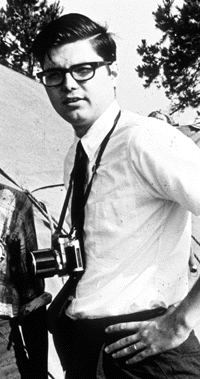King's legacy requires warriors of affirmation
| We were all harnessed to the same unnatural burden: white Americans free only in action and black Americans free only in conscience. King's dream was the American dream, and the civil rights movement emancipated us all. Jim Peppler was the chief photographer for the Southern Courier from 1965 to 1968. He went on to become a photographer for Newsday. His photographs of the Civil Rights Movement have appeared in numerous books and publications, and are used throughout this web site. This essay appeared in Newsday as an op-ed piece April 7, 2007. |
 |
| Jim Peppler, chief photographer for the Courier, in the 1960's. |
I was privileged to spend the years between 1965 and 1968 photographing events in the civil rights movement throughout Alabama. In the years since, I've covered American society from the poorest to the richest and in all of our richness of cultural diversity, uplifting and tragic.
Nothing compares in my judgment with the recollection that the Rev. Martin Luther King Jr., assassinated 39 years ago this week, was the pre-eminent icon for the best and finest of our nation. He was the most powerful warrior of our time, and the civil rights movement served as an example of America at its most powerful.
There is a large distinction between the warrior ideal of the aggressive conquering overlord and that of the hero/warrior who risks all to preserve the life and liberty of his family and community. I ask America: Put aside idealizations of "Rambo"-like military heroes. The highest embodiment of courageous warriors were those who voluntarily surrendered anonymity and safety to endure beatings, prison and possible death with no armor except their goodwill and outrage at injustice in the affirmation of their rights. They risked their lives for us all, and King defined the warrior genre as no other.
Beyond King's effectiveness, there was a wonder and secret power evident in his awareness and acceptance of the knowledge that inherent in each of us is value. Although that knowledge is codified for Americans in our Constitution, this worth is the core of every person on Earth. Between aggression and affirmation, it is affirmation that is by far the most effective tool for resolving conflicts of interest between us.
Most often King is acknowledged as a hero/leader of the African-American community in its struggle to achieve civil rights. Many of us also realize that his actions and sacrifice were clearly seen by him and felt in us as part of a struggle to free all Americans from the burden that injustice had shackled us to in the lie that discrimination had any foundation in life.
We were all harnessed to the same unnatural burden: white Americans free only in action and black Americans free only in conscience. King's dream was the American dream, and the civil rights movement emancipated us all.
Throughout his life, King uncompromisingly spread the simple message: We are one, as Americans and as people. He explained that the Promised Land he saw beyond the horizon was one we all possess when in unity we live together in time and place.
Since 1968, we have, for the most part, achieved an equal sharing of the rights of citizenship, education, employment and freedom from overt discrimination based on the superficial.
The fuller legacy of Martin Luther King Jr. has yet to be actively realized: that nonviolent action defines the only appropriate warrior class capable of creating the society we all dream of occupying.
Copyright 2007 Newsday
